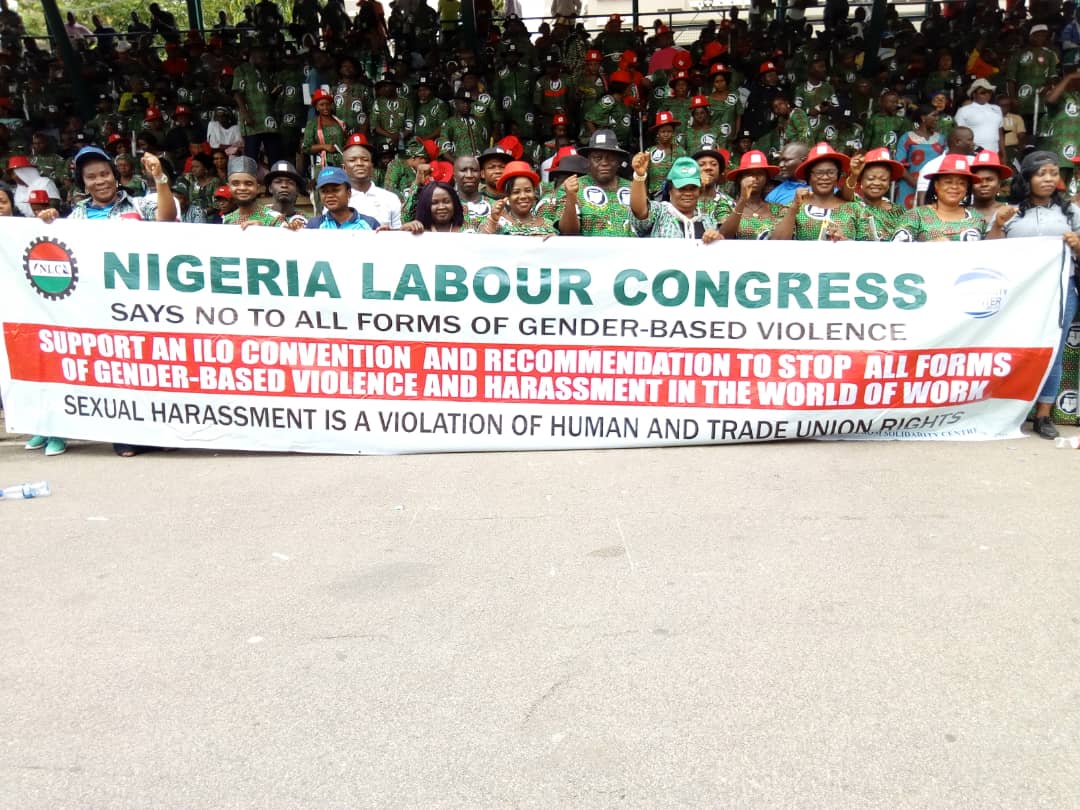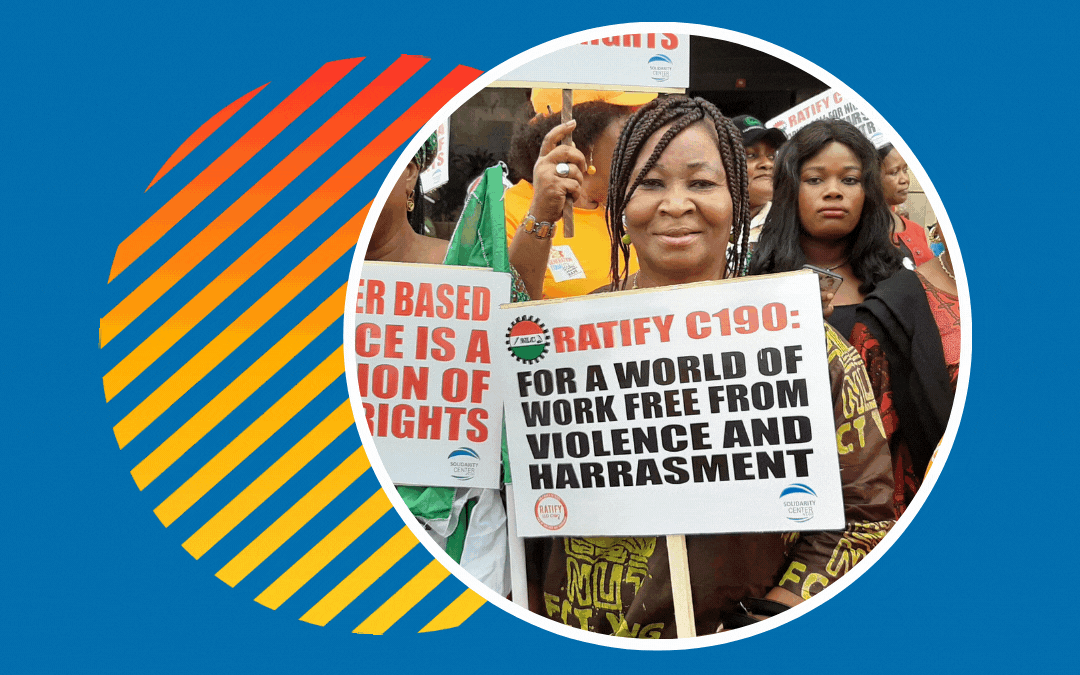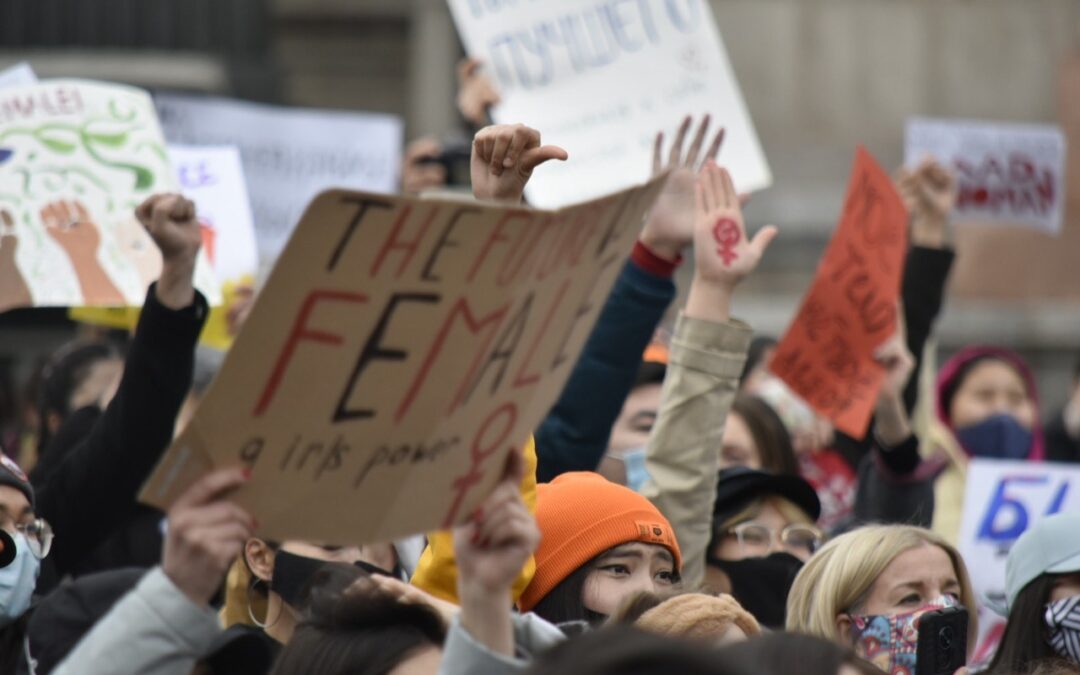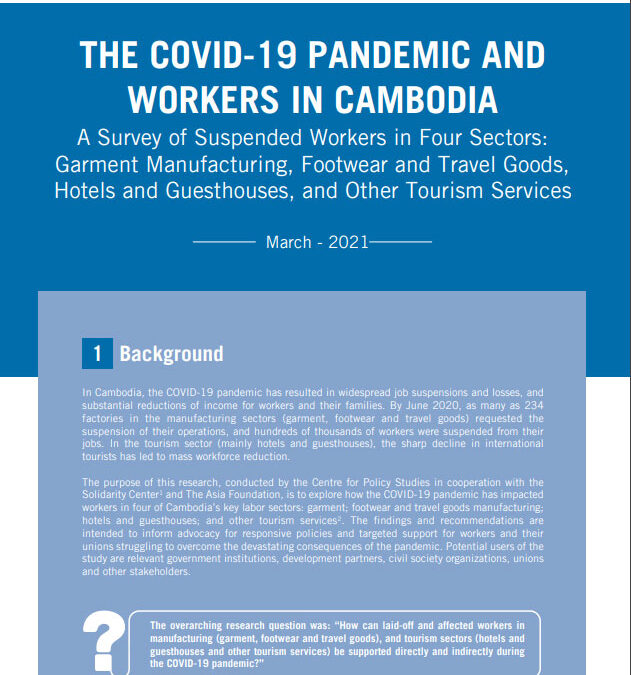
Dec 8, 2021
A new report by the Nigeria Labor Congress (NLC) and the Solidarity Center, “Breaking the Silence: Gender-Based Violence in Nigeria’s World of Work,” finds that gender-based violence and harassment (GVBH) at work is widespread in Nigeria, but goes largely unreported. The report looks at the pervasiveness of GVBH in Nigeria—which boasts Africa’s largest economy, the continent’s biggest trade union movement, and a growing population of 200 million.
A lack of worker-led research about the scope and incidence of GBVH in Nigeria’s world of work, poor implementation and enforcement of laws and workplace policies, entrenched discriminatory gender norms, and an inadequate legal framework hampered civil society and union efforts to address the problem. Moreover, the COVID-19 pandemic has exacerbated these dynamics, exposing many workers, particularly women and other marginalized workers, to an even higher risk of GBVH.
The NLC and the Solidarity Center partnered to address the lack of data on GBVH in the world of work. The NLC established a women and youth structure known as the National Women Commission in September 2003, which works with NLC affiliates and stakeholders to promote gender equality and empower women and youth to take on leadership positions. It facilitates programs that address GBVH at work.
Through this structure, women workers successfully campaigned for the NLC sexual harassment policy. This victory paved the way for women to play a leading role in the adoption of the International Labor Organization (ILO) Convention 190 (C190)—the first global, binding treaty that recognizes the fundamental right to a workplace free from violence and harassment, including GBVH.
Assault In Lagos Market
A recent incident of alleged GBVH shows the importance of this work. Earlier this month, a magistrate court recommended prosecution for a man accused of sexually assaulting a minor in an open market in Lagos. The International Lawyers Assisting Workers (ILAW) network, a project of the Solidarity Center and now the largest global network of workers’ rights lawyers and advocates, is assisting with the case.
The court’s recommendation is a direct result of awareness training with market vendors about their right to GBVH-free workplaces. Following the ILO’s adoption of C190 in 2019, the NLC and the Solidarity Center began training workers to put into practice provisions preventing GBVH. A newly formed GBVH task force in the market brought attention to the alleged assault, leading to a trial in Nigeria’s high court.
Breaking The Silence
The report results from efforts by women workers to provide concrete evidence regarding the scope and incidence of GBVH at work and break the silence to tell their stories of strength and courage.
Women workers identified two locations for study in Abuja and Lagos. Then, they drafted questions and conducted one-on-one interviews with peers. In the first stage—from September 7, 2020, to October 29, 2020—researchers interviewed 425 women. During the second stage—from December 7, 2020, to February 26, 2021—researchers 494 women. In total, women workers interviewed 919 of their peers and captured data across eight sectors, including the informal economy, manufacturing, healthcare, education, construction, media, hospitality and the public sector.
Behind these numbers are women workers like Amina,* an office cleaner who says she was sexually assaulted by a supervisor and was laid off by her employer. Saraya, a market porter, says she experienced groping and inappropriate touching while commuting to and from work and sexual harassment on the job.
Magdalene, a quality inspector at a bottling company, says she was sexually harassed and sexually assaulted by her supervisors. “I find that the joy that comes with going to work every day is no more there,” she said.
Ada has co-owned a bar with her husband. His domestic violence in their marriage extends to her workplace. “I have never reported to anyone. You are the first person I am sharing this with,” she told an interviewer.
An anonymous male youth trader spoke of the need for more training on GBVH. “We need training on GBVH for men in our market,” he said. “I believe that trainings will go a long way in sensitizing men on the negative impact of GBVH on the lives of women and children.”
Regina Otorkpa, who interviewed women workers, says, “GBVH is a monster silently destroying the confidence and future of survivors still struggling to speak out due to fear of society, fear of self and discrimination.
“Having interacted with survivors of the different forms of GBVH in Nigeria’s world of work, it has become important for the Nigerian government to step up and take a bold step towards C190 ratification. I urge women to be brave and courageous to unmask their fears; it is important that we stop the stigmatization; the struggle against GBVH is a collective one for the good of all.”
Findings and Recommendations
The report unveils high rates of GBVH at work, which goes largely unreported. Findings include:
- More than half (57.5 percent) of women workers interviewed said they experienced GBVH in the world of work.
- Nearly 44 percent said their supervisor or superior had said or done something that made them uneasy due to their gender.
- Only 19.6 percent said they reported incidents of GBVH at work.
- More than one-third (35.9 percent) said they rarely received justice even when they reported violations.
- Some 44 percent said they had suffered gender discrimination that affected their career advancement.
- Nearly one-third (28.8 percent) said they were pressured for sexual favors at work and touched in ways that made them uncomfortable.
Based on this research, the NLC’s recommendations for unions, employers and the Nigerian government include:
- Increased education and awareness of GBVH among workers, managers and supervisors, the general public and policymakers, including its root causes and impacts and the responsibility of all workers to end it.
- Ratification and implementation of ILO Convention 190 concerning the elimination of violence and harassment in the world of work, including GBVH.
- Development of workplace policies to address GBVH and gender discrimination, including safe, confidential processes for reporting incidents; transparent processes for investigation of allegations; remedies for workers who experience GBVH; penalties for perpetrators; and changes to how work is organized to address power imbalances and other risk factors for GBVH in the world of work.
- Adoption of national legislation incorporating the definition of GBVH from ILO C190, protecting the entire world of work and covering all workers regardless of contractual status, including workers in the informal economy.
*All names are pseudonyms to protect the identities of women workers.

Nov 17, 2021
Union women are not waiting for their governments to ratify Convention 190, the international treaty that addresses gender-based violence and harassment in the world of work—they are taking action now to ensure workers benefit from the powerful rights it provides, according to Rita Goyit, speaking on this week’s Solidarity Center Podcast.
“We are taking concrete measures while we wait for the ratification,” says Goyit, head of the Nigeria Labor Congress (NLC) Department of Women and Youth and secretary of the NLC’s National Women Commission.
With support of the NLC and Solidarity Center, union activists conducted an informal survey of more than 900 women workers in Abuja and Lagos and found 57 percent had experienced GBVH at work, yet 20 percent did not report it for fear of employer retaliation.
“What was common about the story is that sexual harassment, gender-based violence exists in the workplace,” Goyit tells Solidarity Center Executive Director and podcast host Shawna Bader-Blau. “And it was not treated as a workplace issue.”
Through outreach and training, Nigerian unions are reaching workplaces as diverse as garment factory floors and sprawling informal markets, where workers put in place what works for them, like anonymous suggestion boxes to report harassment.
Goyit says union women are developing strategies that “will really address gender-based violence in the workplace because this is a worker-specific issue, it’s coming from with the workers ourselves.
“We’re putting our heads together until we find the solution … because the women are with us. Because I feel strong when I see the other women around me in our campaigns, in the negotiations that we do.”
More from The Solidarity Center Podcast!
Listen to this and all Solidarity Center episodes here or at Spotify, Amazon, Stitcher, Castbox or wherever you subscribe to your favorite podcasts.
Download recent Season Two episodes:
The Solidarity Center Podcast, “Billions of Us, One Just Future,” highlights conversations with workers (and other smart people) worldwide shaping the workplace for the better.

Nov 12, 2021
Победа в борьбе за гендерное равенство и равенство в оплате труда в бывшей советской республике Казахстан: в прошлом месяце эта страна отменила список рабочих мест, юридически недоступных для женщин с 1932 года. Такие дискриминационные списки, которые вынуждают женщин отказываться от более высокооплачиваемой работы в традиционно мужских секторах в пользу низкооплачиваемых профессий, в которых доминируют женщины, – типичны для данного региона, а также для Беларуси, Кыргызстана, России и Узбекистана.
Отмена данного списка в Казахстане стала возможной в результате многолетних усилий адвокации партнера Центра Солидарности – Казахстанского Международного Бюро по правам человека (КМБПЧ) на встречах, конференциях и других форумах с политиками и представителями правительства, включая Министерство труда и социальной защиты Республики Казахстан и Комиссию по правам человека при Президенте Республики Казахстан.
“В современном мире не должно быть дискриминационных ограничений на доступ к работе, и все люди сами имеют право выбирать, где и как работать”, – сказал заместитель директора КМБПЧ Денис Дживага.
Работа, в которой ранее женщинам было отказано, включала относительно хорошо оплачиваемые рабочие места в строительстве, металлообработке, горнодобывающей промышленности и нефтедобыче, в том числе: работы, выполняемые на высоте или под землей; квалифицированные строительные, дорожные и металлообрабатывающие работы, включая кладку, работу на землеройной технике, плавку руды, установку труб и сварку; а также специализированные работы в разведке и геодезии, такие как бурение скважин, установка вышек и прессование труб.
Международная организация труда (МОТ) уже давно призывает государства отменить списки профессий, запрещенных для женщин, учитывая их дискриминационное воздействие. Женщины в Казахстане, например, зарабатывают в среднем на 32 процента меньше, чем мужчины.
Список Казахстана, который ограничивал доступ женщин к более чем 200 профессиям на том основании, что работа была слишком тяжелой или опасной с физической точки зрения, был отменен после того, как правительство Казахстана признало в Комитете ООН по ликвидации дискриминации в отношении женщин (КЛДЖ), что запреты на работу способствовали неравенству в оплате труда мужчин и женщин. Комитет ООН по экономическим, социальным и культурным правам (CESR) рекомендовал Казахстану рассмотреть другие формы правовой защиты женщин, чтобы обеспечить их безопасность на работе, а не осуществлять полный запрет на доступ к определенным профессиям.
“Гендерное равенство и равенство в оплате труда требуют, чтобы мужчины и женщины имели равный доступ ко всем видам работы и чтобы все рабочие места были безопасными для всех работников”, – подчеркнул директор региональной программы Центра солидарности в Европе и Центральной Азии Руди Портер.

Nov 12, 2021
In a win for gender and pay equity in the former Soviet region of Kazakhstan, last month the country abolished a list of jobs from which women have been legally barred since 1932. Such discriminatory lists—which force women away from higher-paid work in traditionally male-dominated sectors toward lower-paid, female-dominated occupations—are common in the region, including in Belarus, Kyrgyzstan, Russia and Uzbekistan.
Abolition of Kazakhstan’s list came about after years of advocacy efforts by Solidarity Center partner Kazakhstan International Bureau for Human Rights (KIBHR) in meetings, conferences and other fora with policy makers and government representatives, including the Ministry of Labor and Social Protection of the Republic of Kazakhstan, and the Commission on Human Rights under the President of the Republic of Kazakhstan.
“In the modern world there should not be discriminatory restrictions on access to work and all people themselves have the right to choose where and how to work,” said KIBHR Deputy Director Denis Jivaga.
Among the jobs previously denied to women were relatively well-paid jobs in construction, metalwork, mining and oil extraction sectors including: jobs performed at-height or underground; skilled construction, road and metal-working jobs including masonry, ground-moving machine operation, ore smelting, pipe fitting and welding; and specialized work in exploration and surveying such as borehole drilling, derrick installation and pipe pressing.
The International Labor Organization (ILO) has long called on states to abolish lists of professions prohibited for women given their discriminatory impact. Women in Kazakhstan, for example, earn 32 percent less than men on average.
Kazakhstan’s list—which restricted women from more than 200 jobs on the grounds that the work was too physically demanding or dangerous—was abolished after the Kazakhstan government acknowledged to the UN Committee on the Elimination of Discrimination Against Women (CEDAW) that job prohibitions have contributed to gender-pay inequity. The UN Committee on Economic, Social and Cultural Rights (CESR) recommended that Kazakhstan consider other forms of legal protection for women to keep them safe at work rather than a total ban on access to certain professions.
“Gender and pay equity require that men and women have equal access to all types of work, and that all jobs be made safe for all workers,” says Solidarity Center Europe and Central Asia Regional Program Director Rudy Porter.
Read in Russian.

Jun 8, 2021
As a new wave of COVID-19 hits Cambodia, a new study recommends urgent action to ensure garment and tourism workers workers do not experience widespread loss of jobs and wages as they did in 2020. The Center for Policy Studies survey is supported by Solidarity Center and The Asia Foundation.
Download here.




